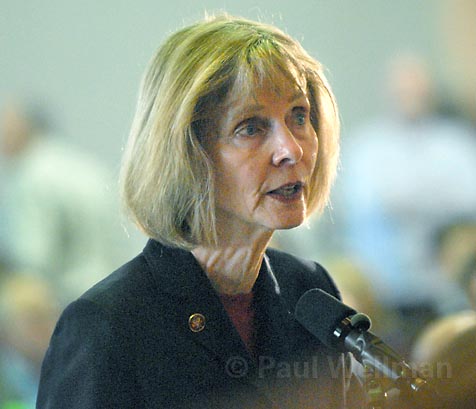Why Is This Woman Smiling?
Lois Capps Forecasts a Happy Ending for Democrats on Health Care Reform

At 5:30 a.m., Lois Capps stood in the dark, bringing up the rear of a very long line that wasn’t moving Denver-bound passengers into the departure lounge at Santa Barbara Municipal Airport. Sipping at a bottle of ruby red juice, the Democratic congressmember was an island of chipper cheerfulness in a sea of cranky air-travel people grumbling, yawning, and mainlining black coffee in the misty morning air.
Suddenly, Capps smiled brightly at an unshaven reporter who’d just dumped his spouse at check-in and was headed home to grab a few more zzzs when he stumbled into a chance encounter with his duly elected representative in Washington. Without a hint of annoyance, she chirped a happy answer to a question he felt duty-bound to mumble in her direction.

“We’re going to get it done,” Capps instantly responded to a request for a prediction about health-care legislation in Congress.
In the darkness before dawn, Capps’s bright and sunny tone reflected the prevailing mood of progressive Democrats across the nation who have witnessed the unlikely rebirth of sweeping health reform, after it was given up for dead amid the detritus of last summer’s right-wing tea parties and death panel town halls. Supporters, like Capps, of a government-backed “public option,” designed to compete with private insurers in selling coverage to consumers, were jubilant as Senate Leader Harry Reid (D-Nevada) unexpectedly announced his backing for a version of the plan.
While the public option enjoys strong Democratic support in the House, the chance of getting any reform bill that included the feature voted out of the Senate was seen as near-impossible just days ago. But Reid, under pressure from liberals while facing a tough reelection campaign, emerged from closed-door talks to declare he favored a public option bill that would permit individual states to opt out of the program. His proposed, still-sketchy Senate compromise would also limit enrollment to those without health insurance. Although some liberals looked upon Reid’s plan with disdain, his move, as a political matter, represents a crucial development that raises the odds for a bill containing some form of public option.
“I think he’s feeling the heat from his liberal base,” Capps said of Reid, referring to his shaky political standing in Nevada.
Despite the Senate leader’s surprise move, final votes on a final health-care measure are still a long way off, with a tangle of gnarly issues still to be navigated. One is a brewing intra-party fight among Democrats regarding a key Capps amendment to a House bill that would govern payment for abortions under a public option plan. Her “abortion neutral” amendment requires that no federal money be used to finance elective abortions, a guideline that restates an existing policy prohibition. However, the amendment would allow individuals who receive federal subsidies for insurance through the public option to pay for the procedure themselves. While intended to keep separate federal and private funds for abortion reimbursements, Capps’s measure is derided by pro-life House members as “an accounting gimmick” that provides a fiscal sleight-of-hand method to effectively fund abortions with public funds.
Capps said that four pro-life Democratic committee chairs, led by Representative Bart Stupak of Michigan, are pressuring Speaker Nancy Pelosi on the issue, which could yet erupt into a brawl between pro-choice progressives and more conservative Blue Dog Democrats.
NAVA’S NEW OIL TAX: Assemblymember Pedro Nava wants you to know that AB 1-6X is not the title of a new science fiction movie but the formal designation for his measure to impose a 10-percent tax on oil company revenues derived from drilling in California. The weird tag comes about because Nava was the first assemblymember to introduce a bill in a just-convened special session, the sixth of the current Legislature’s term. If approved, Nava’s proposal would generate about $1.5 billion annually for the state.
Just three years ago, California voters soundly rejected a similar plan, a ballot initiative to slap an extraction tax on oil companies and earmark the money for alternative and green-energy projects. But Nava, who’s running for Attorney General, told The Independent he thinks the political landscape has shifted, amid billions in recent spending cuts for schools, health, and social welfare programs. “People are now in a position where they can actually feel the cuts we made last year,” he said.



